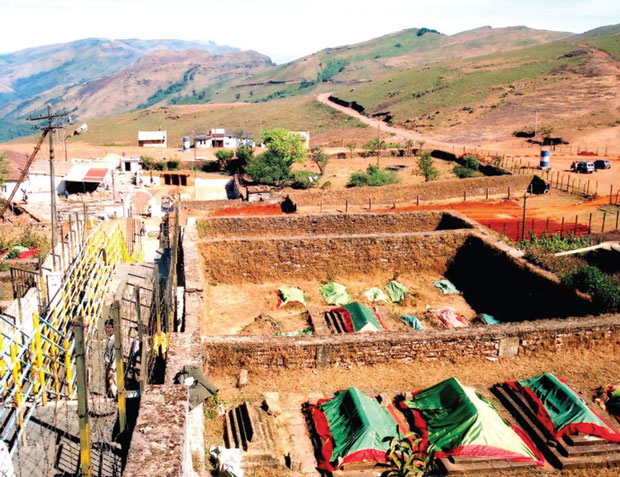
.jpg)
Karnataka’s secular groups continue to foil the state’s veiled attempts to saffronise Bababudangiri shrine
The winter is never cold at Bababudangiri shrine in Karanataka’s Chikmagalur district. Blame not the weather, which is freezing almost throughout the year. It is the hate campaign of the saffron forces that raises the mercury of the political barometer. But as CC readers know, after secular forces in the state took up the challenge to restore peace and a non-communal people’s culture at Bababudangiri and facing determined efforts from the Karnataka Communal Harmony Forum (Karnataka Komu Souharda Vedike), communal forces were put on the defensive. It was concerted efforts by the Forum and other secular forces in the state that foiled the sangh parivar’s attempts to make Bababudangiri into another Ayodhya. Due to mounting pressure and protests by secular forces, which outmatched the pressure exerted by the sangh parivar, the state government – whose coalition is attributed to secularism – had to enforce strict prohibitory orders against the parivar and ban the Shobha Yatra, a communal congregation organised in the name of Dattatreya at Chikmagalur in December 2004.
Although secular forces in the state had won the battle, it was soon realised that the restoration of people’s culture and revamping of communalised practices was no easy task. And this time it was the state government that was speaking in a saffron voice. In the name of banning ‘both saffron and green’, Rajendra Katharia, the district commissioner of Chikmagalur who had played such an important role in enforcing the government order against the sangh parivar in December 2004, began subsequently to implement unilateral measures that violated the spirit of the court orders. In the process, the district administration with the tacit approval of the state government initiated some so-called developmental and non-religious activities intended to destroy the very Sufi nature of the shrine.
During the last Datta Jayanti period itself in December last, the district administration had invited three seers of avowed anti-Muslim theology to perform inside the shrine. The Muzavar, who is traditionally entitled to offer prayers, was moved out of Bababudangiri. The khalichaas or green covers laid over the tombs were removed and the tombs were left bare, something that has not been restored to date. Under the guise of developing the area into a tourist centre, old religious structures were razed to the ground, showing less than scant respect for the religious sentiments of devotees. The Langarkhana, which provided food to devotees who come from as far as Ajmer and elsewhere, was stopped and the Fakirkhana, which provided shelter, was closed down. Hotel rates were hiked to prohibitive levels ostensibly to raise institutional revenues. For the first time in Bababudangiri’s history, fees were fixed for many services provided to devotees. Also for the first time, the eating of non-vegetarian food was prohibited at the shrine. Keeping in mind the poor, Dalit, Muslim and Backward Caste background of Bababudangiri devotees, one can only imagine the enormous difficulties that the new measures caused. But more than the physical inconveniences, it is the assault on their religious beliefs and food practices as well as the administration’s attempts to convert this historic Sufi shrine into a commercial tourist centre that has enraged people in the state.
The Forum was the first to raise its voice against these measures. The steps taken by the administration are in complete violation of the court order, which directs the government unambiguously to maintain pre-’75 status at the shrine and thus pre-empts measures such as those taken by the government recently. The Vedike also believed that the administration would attempt to fulfil the saffron agenda in disguise thereby disrespecting the hitherto multi-religious culture and practices of the shrine. The Vedike sent two fact-finding teams to Bababudangiri and also held negotiations with representatives of the district administration, attempting to explain how its measures contravened court orders; the authorities were regrettably uncooperative. When all else failed, the Vedike launched protest activities at Chikmagalur and elsewhere until the government was finally forced to heed the protests and all steps taken by the administration were temporarily suspended.
Meanwhile, this year too sangh parivar forces have declared that they will continue with the Dattamala and Datta Jayanti programmes and have reiterated their resolve to liberate the shrine from the hold of Muslims and convert it into a full-fledged Dattatreya temple. In October 2005 the sangh parivar conducted a two-week long Dattamala Abhiyan, but this time their strength was considerably reduced. There are many reasons for this. Consistent activities by the Vedike have exposed the communal and political designs of parivar forces behind these so-called religious activities. Secondly, the parivar’s strength has dwindled. The falling out of firebrand Pramod Mutalik, former South India convener and state leader of the Bajrang Dal who now heads the state unit of the Shiv Sena, is but a reflection of this process, as the parivar’s wider communal appeal begins to wane. And by and large, the state government and district administration seem inclined to curb activities that are overtly defiant. Nevertheless, last December it was the district administration that had itself countered the court order to invite its choice of seers to the shrine, a fact that is especially alarming.
The Karnataka Komu Souharda Vedike has taken note of all these developments and has called upon all its state units to be extremely vigilant and not get complacent about the steps taken by the ‘secular’ coalition government in Karnataka. The Vedike, with the help of other secular forces, is launching a campaign to liberate Bababudangiri from the sangh parivar. It has already come out with several books, pamphlets and other literature to expose both the state government and the sangh parivar’s designs. It is only concerted and vigilant peoples’ actions that can be the sole guarantee for secularism in this country and not state policies. This is once again being proved in the case of Bababudangiri.
